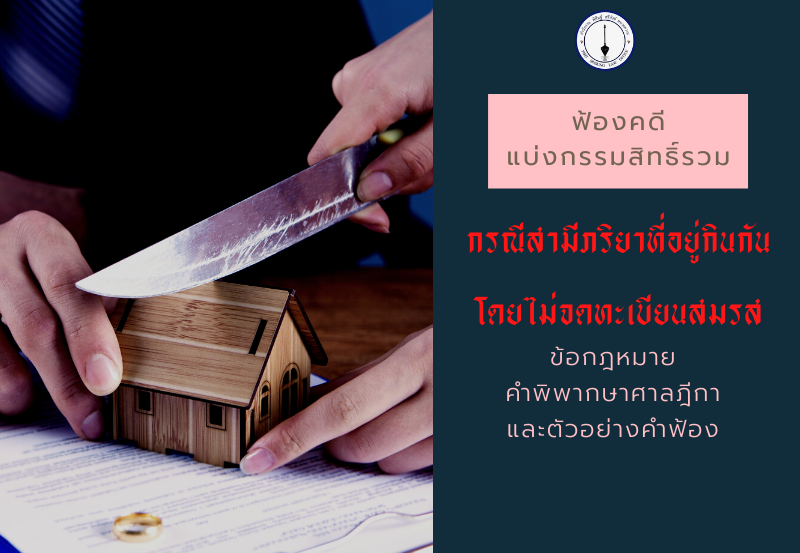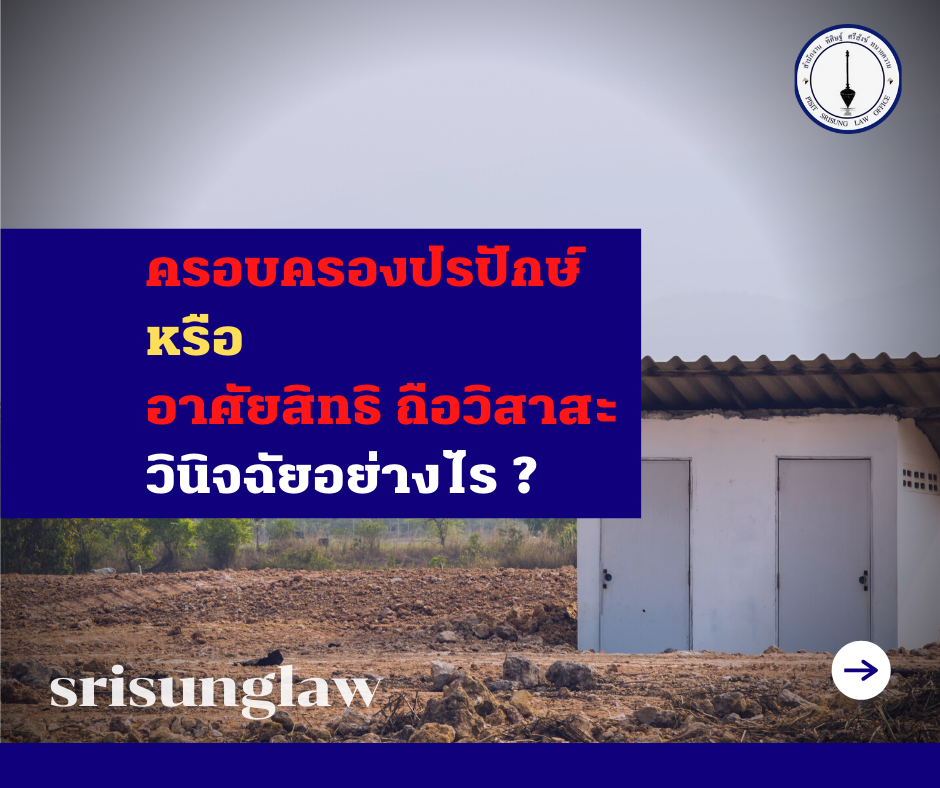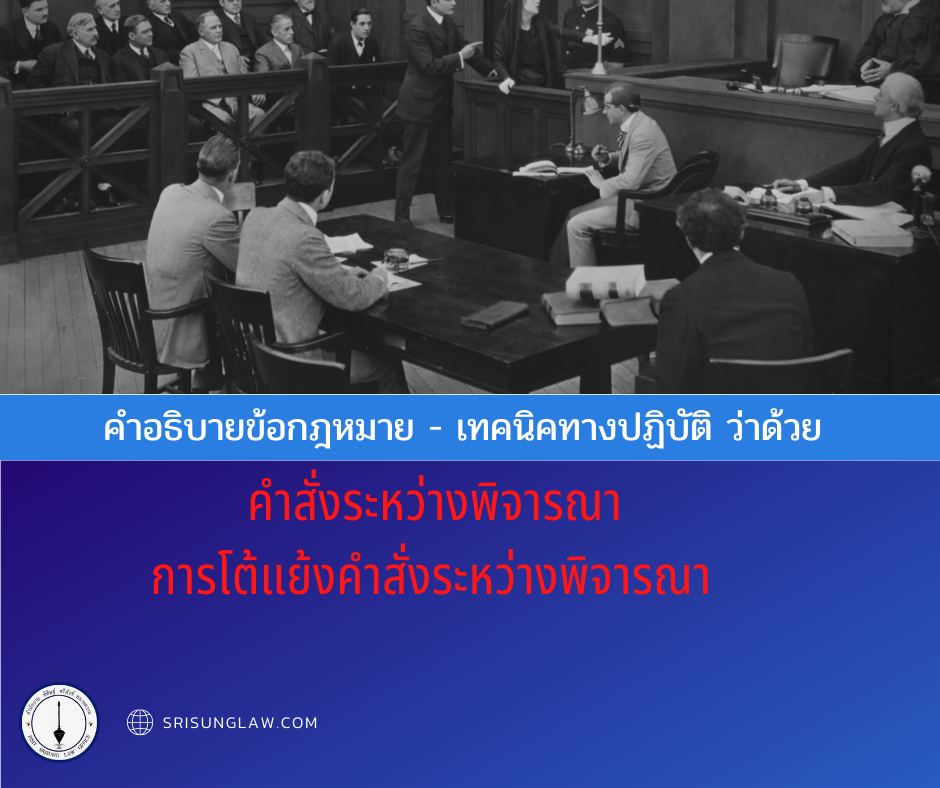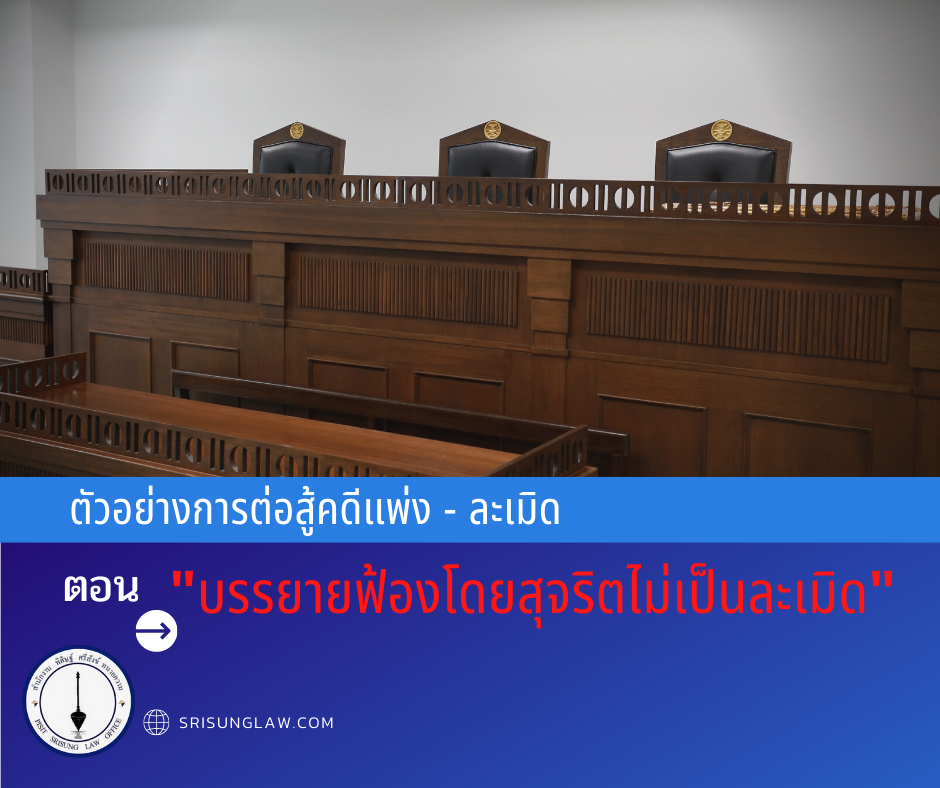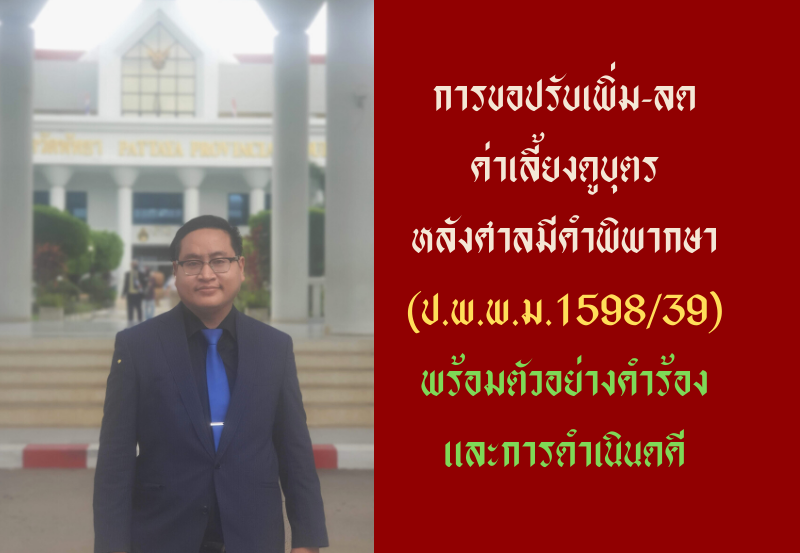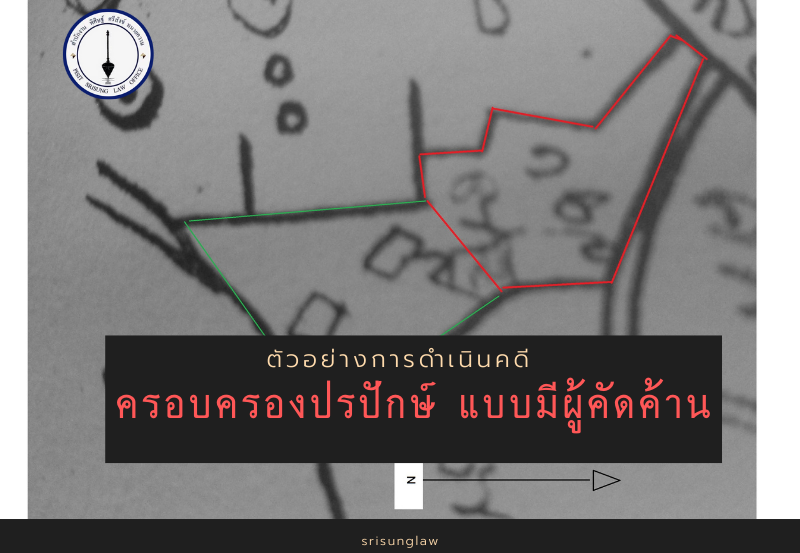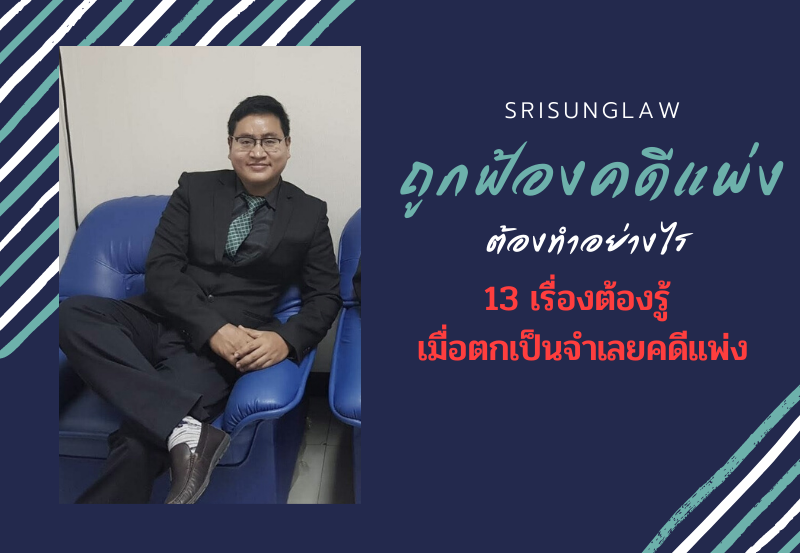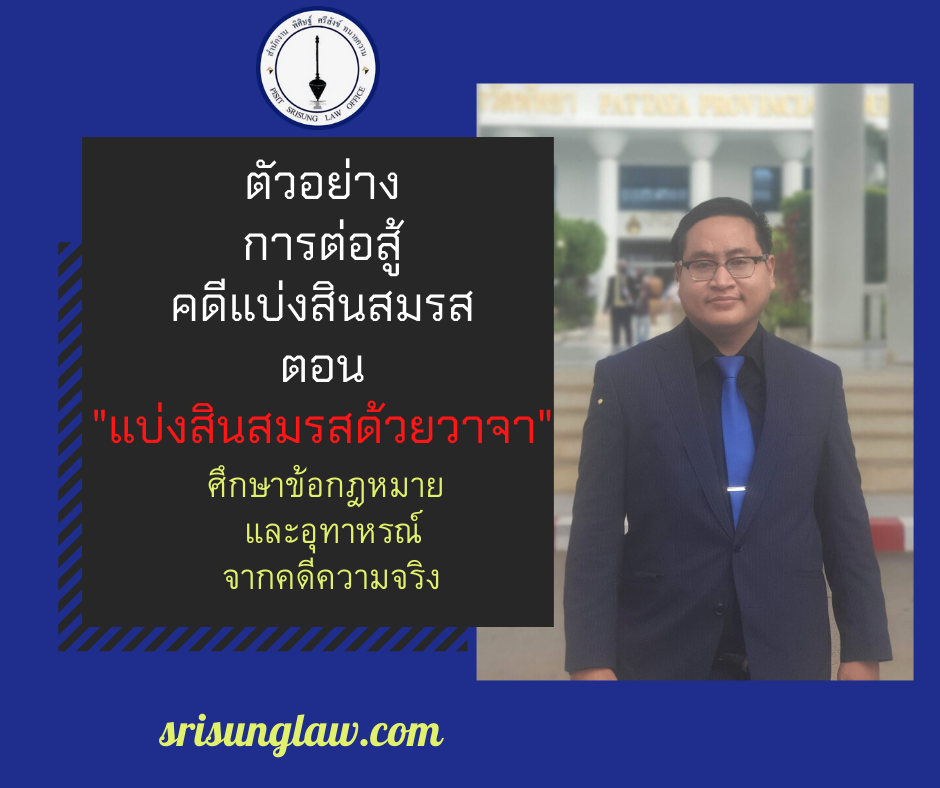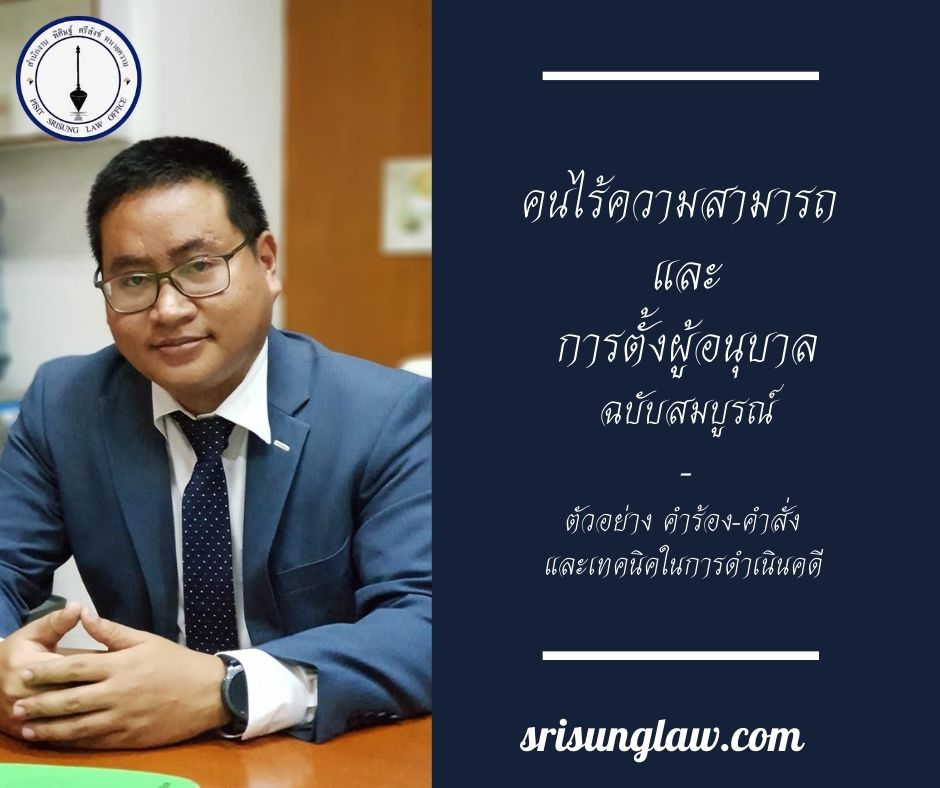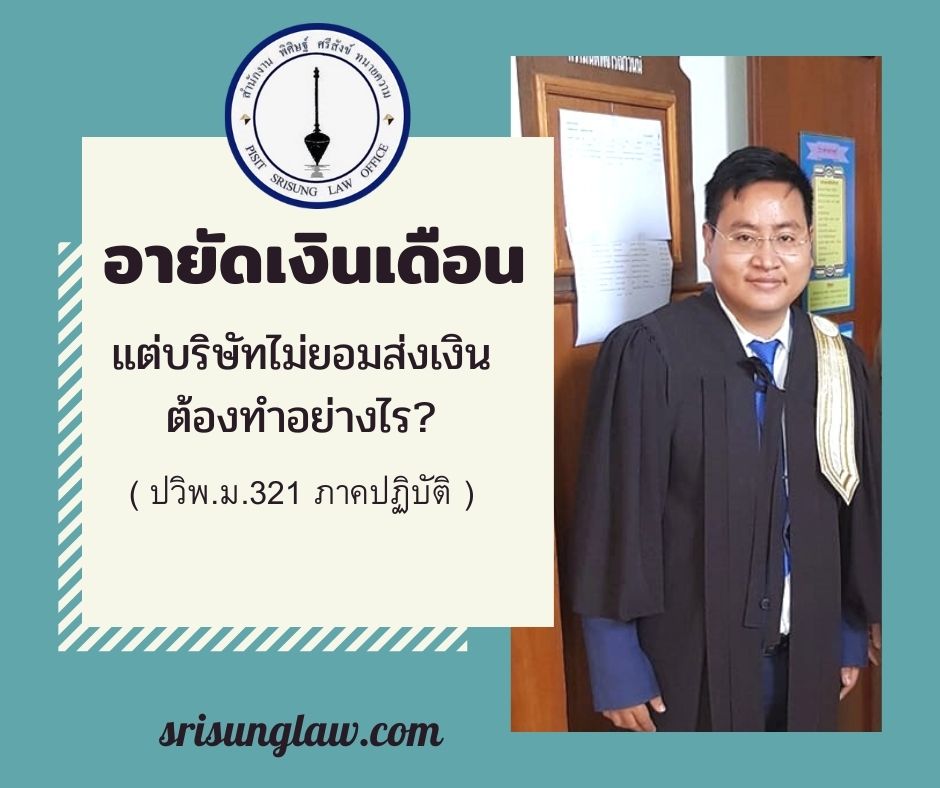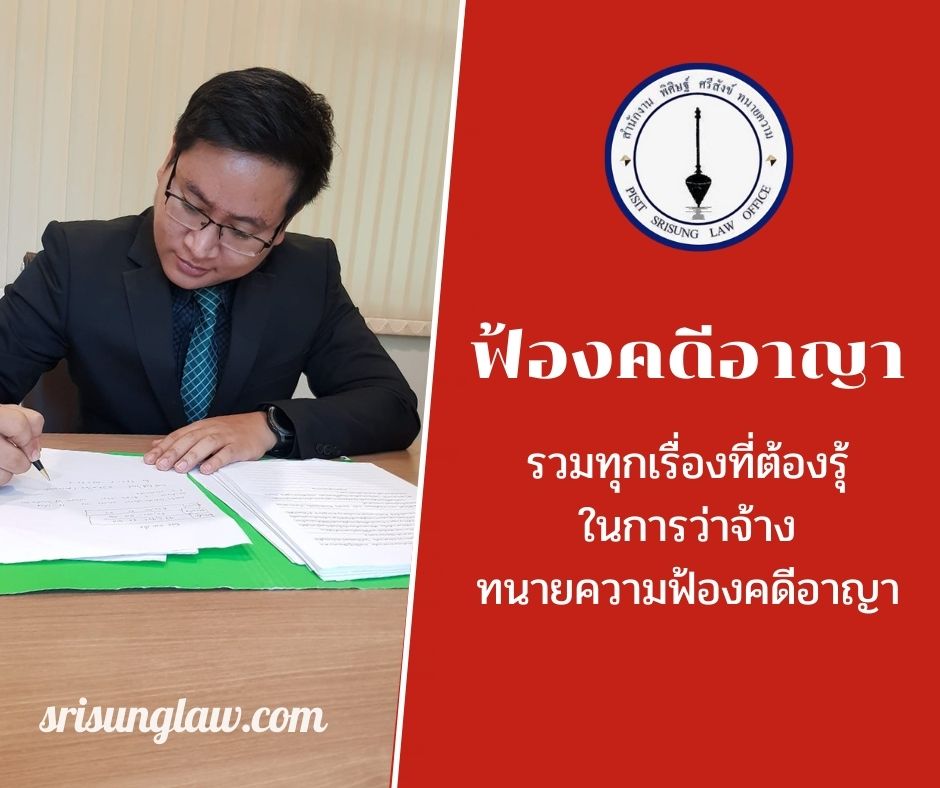Normally, if a man and a woman register their marriage, they are legally husband and wife. Property earned together is joint marital property, therefore all according to Civil and Commercial Code Section 1474
But even though the man and woman have not registered their marriage together, But they lived together as husband and wife. Together we can earn together. or share suffering together in the nature of life partnership If there is property that occurred during that time It is considered to be joint ownership to which both parties have the same rights.
Suing for division of collective ownership In a case with facts like this It’s something that happens very often. Therefore today I have brought the law. Example of a lawsuit for division of collective ownership Let’s distribute it for friends to watch and use as a guide to working.
Legal points-explanation-Supreme Court judgment
Legal
Section 1357 It is presumed that the owners together have equal shares.
Section 1363 Each co-owner has the right to demand a division of property. Unless there is a legal conflict. or if the objects of joint ownership are of a permanent nature Can’t be called to divide.
Right to demand division of that property. You can’t cut it by legal act for more than ten years at a time.
The co-owner cannot call for the division of property at an inappropriate time< /span>
Section 1634 The division of property should be done by dividing the property itself among the joint owners. or by selling property and dividing the proceeds from the sale.
If the joint owners do not agree on how to divide the property, When one of the owners requests The court may order the property to be divided. If the portions divided are not equal, You can order a replacement in the form of money. If such division is not possible or will cause much damage, that’s fine. The court may order the sale by auction among the joint owners or by public auction.
Description
A man and a woman live together as husband and wife. Even though the marriage has not been registered The property acquired is not considered marital property according to the Civil and Commercial Code, Section 1474.
However, if it turns out that while living together Having assets that can be earned together, such as
Both men and women. Together we can find it. Doing business together Or different people work full time. Each person runs their own business but uses the money they earn to spend on family expenses. Buying property together
Or even if it is the case that only the male side can provide. Being a business operator The women did not make a living together. But if the woman only stays at home, takes care of housework, trains children, and manages various affairs in the house alone.
The law considers property that grows between No matter who’s name It is considered joint ownership of the man and the woman.
Because the law considers Having the woman take care of the housework and training and taking care of the children gives the man the opportunity to fully perform his own work duties. If there is no woman waiting to be a good back of the house Men are also unable to fully engage in their work. which is a principle called Being partners in each other’s lives
So, when men and women or even as a homosexual couple such as between a man and a man or woman and woman If we lived together like lovers Living together as a family There is a clear division of duties in the family. There is generosity and support for each other. As such, they are considered life partners. and assets that grow during a life partnership It is considered to be the joint ownership of both parties.
with examples of Supreme Court judgments. as follows
KL.684/2508 Plaintiff and defendant married according to custom. (Marriage not registered) Living together as husband and wife, making a living together, having additional property. This additional property belongs jointly to the plaintiff and defendant. The defendant has the right to request a half share.
As the defendant claims, the marriage between the plaintiff and defendant is not legal. The plaintiff has no right to sue for a division of the money he earned while living together with the defendant. The plaintiff has no right to sue for partition only of the property that the defendant acquired without the plaintiff participating in the acquisition only. But in this case, the facts appear that After the plaintiff and defendant lived together and worked together to earn a living like husband and wife. There was an increase in deposits in the Government Savings Bank from the amount that the defendant had originally deposited, 11,782.11 baht. It cannot be said that it was money that the defendant earned alone, without the plaintiff having any help in finding it, so they had to divide it in half.
K.516/2508A man and a woman live together as husband and wife without registering their marriage. They jointly bought rice fields and farmed them, indicating their intention to be considered joint owners. As for the money purchased, which side will borrow it from whom? It is another matter, not related to the property itself. Because men and women mixed their wealth together to use and make a living together. It must be considered that different rights are owned by each half. (Citing the Supreme Court at 303/2488)
KL.561/2510 The deceased had a legal wife beforehand. Later, the wife separated and lived separately without divorce. The deceased plaintiff came to live together as husband and wife. illegally The plaintiff and the deceased worked together to make a living without his former wife joining them. The plaintiff brought the plaintiff’s property to the deceased for interest. and did business Helping the deceased collect rent as follows: It can be considered that the deceased and the plaintiff were farming together. Therefore, he is a joint owner and has equal shares. When the deceased dies, his ex-wife has no rights to the property that belongs to his new wife at all.
K.83/2512 The marriage of a man and woman without registering their marriage. Even though legally they are not legally considered husband and wife. It does not affect the property rights that men and women can depend on under general law.
During the time that the petitioner and the defendant had not yet registered their marriage, but according to the circumstances in which the petitioner and the defendant treated each other. For example, the petitioner goes into business by himself. As for the defendant, he raised his children as a housewife. and the petitioner paid money to buy land and build buildings and structures on the land. Then the defendant complainant and his child lived together all the time. It shows that the petitioner and the defendant worked together to make a living and acquire property as the property of the petitioner and the defendant together. Both intend to be owners of the disputed property by using it as a common residence. In such circumstances, it can be seen that all the assets that the petitioner or the defendant acquired during that time Even if it is from the strength or money of either party, it is not important. It must be considered property acquired by both parties with the intention of being joint owners. and when the petitioner and the defendant have registered their marriage. All assets, especially the assets in dispute, are therefore the original assets of the petitioner and the defendant equally.
K.1512/2519 The plaintiff and defendant lived together as husband and wife without registering their marriage. and worked together to earn a living in business The property that occurred during that time is property that the plaintiff and defendant earned together. Therefore, the plaintiff and defendant each have joint ownership of those assets. The division of such property must therefore be divided equally between the plaintiff and the defendant.
The plaintiff describes the lawsuit as follows: The plaintiff and defendant lived together as husband and wife without registering their marriage. and jointly engage in business There were many incomes and assets as stated in the lawsuit. Therefore requesting to divide the income and assets according to the lawsuit in half to the plaintiff. It is a clear indication of the nature of the charge and the request for enforcement. both the claims that are the basis of the charges And the defendant gave his defense on every issue. Shows that the defendant clearly understands the charges. Sue the plaintiff without ambiguity.
Leasehold rights are property. and must be subject to the limitations of the law and contract, which the lessee cannot transfer without the lessor’s consent. But when the plaintiff and defendant have joint rental rights. would be able to share those rights It is not against the law in any way.
ก.3725/ 1989 Although the plaintiff is a woman, she has the personality and acts like a man. The general public understood that the plaintiff was a man. The plaintiff fell in love with the defendant romantically and therefore took the defendant to live with the plaintiff as the plaintiff’s housekeeper for nearly 20 years. The plaintiff and defendant worked together to make a living by acquiring property, whether it was through the strength or money of either party. It is considered that the property acquired is property that both the plaintiff and defendant intend to own jointly. The plaintiff and defendant therefore share one-half of the entire disputed property. According to the Civil and Commercial Code, Section 1357. There is K.1593-1594/2001 Similarly diagnosed
K.786/2533 The fact that the plaintiff and the first defendant came to the dispute while living together as husband and wife without registering their marriage is considered. It is an asset that can be earned together. There is joint ownership by each half. Even though the dispute has the name of the 1st defendant as the sole owner of the title deed, it is also an act on behalf of the plaintiff. The 1st defendant has no right to take the plaintiff’s part of the dispute and register it for transfer and sale to the 2nd defendant without the consent of the defendant. plaintiff Therefore, when the second defendant receives the disputed transfer from the first defendant, knowing that the plaintiff is also the owner. Therefore it is dishonest. Not binding on the plaintiff’s part, the second defendant must therefore register the plaintiff’s name as a joint owner of the disputed land as well.
K.678/2535 The deceased and the first plaintiff, who is his wife, acted together. The hotel business is intended to be jointly owned. The money used to finance the construction of the hotel does not matter from which side it comes from. The hotel must be considered joint property between the deceased and the first plaintiff when the deceased consented to use the said land to build a hotel to conduct joint business with the first plaintiff. 1 The hotel is therefore not a part of the land and falls under the exemption under the Civil and Commercial Code, Section 109. The 5th defendant registered his marriage with the deceased, even though the 5th defendant had broken up with the deceased a long time ago. But when the divorce was not registered The property that the deceased acquired while being husband and wife with the fifth defendant is considered to be marital property. Proceeds from the hotel business including the barber shop received after the deceased person’s death It is not the inheritance of the deceased because it was not property that existed before or at the time of the deceased’s death. But the interest of the hotel goes to the person who owns the hotel in proportion to the ownership of the hotel according to the Civil and Commercial Code, Section 111 and Section 1360 and when the said money is not the inheritance of the deceased. Even if one heir conceals or misappropriates this money That heir is not eliminated from receiving the inheritance.
KL.5438/2537 The plaintiff and the defendant lived together as husband and wife without registering their marriage, although according to the law they are not legally considered husband and wife. Therefore, there is no property between husband and wife. But it does not affect the property rights that the plaintiff and the defendant would have under general law. The plaintiff and the defendant live together and have four children. The plaintiff is a housewife and is responsible for raising the children. As for the defendant, he was a trader and used the money to buy the disputed land and house as a residence together all along. The circumstances can be considered that the plaintiff and the defendant jointly make a living and have the intention of being joint owners of the property from which they earn a living. Even though the defendant testified that the plaintiff and defendant had separated and had agreed to divide the disputed land and house. and the plaintiff received a share of 400,000 baht from the defendant. But when the Court of First Instance pointed out that the two places did not define this issue as a matter of dispute. The defendant did not raise any objections. It is considered that the defendant has waived this issue. The decision of the Court of First Instance on this issue is therefore an outside decision. and it cannot be considered that it is an issue that has already been properly discussed in the Court of First Instance. The defendant therefore has no right to raise the said issue to the Supreme Court. Both lower courts did not dismiss the defendant’s counterclaim as invalid. The Supreme Court can correct it.
Supreme Court Judgment No. 620/2000 Ch. Living together as husband and wife with They did not register their marriage and worked together to make a living by giving out loans. Buy and sell land and act as a land broker The money in the fixed deposit account is property that C. and C. earned together while living together as husband and wife. Therefore, C. and C. each have joint ownership of the said money and must divide it equally between each of them. It is half of C.’s inheritance and is C.’s inheritance. half
The fact that I deposited fixed money with the 2nd defendant’s bank, the fixed deposit money would belong to the 2nd defendant. The 2nd defendant would have a duty to return the fixed deposit in full when Due to M.
I intend to give the money in the fixed deposit account to the 1st defendant and write to the 2nd defendant’s manager to add the 1st defendant’s name and have the right to withdraw the money and close the deposit account instead. The withdrawal of money was deposited in the name of the first defendant because the fixed deposit money had not yet matured. If money is withdrawn at that time, interest will not be received. It can be considered that Ch. has the intention of transferring his claim rights. The money was deposited with the 2nd defendant to the 1st defendant in the form of a transfer of debt to be paid to a specific creditor. When there has been correct compliance with the Civil and Commercial Code, Section 306, paragraph one, by Ch. in writing, signed and notified to the second defendant, who is the debtor of the right to demand the transfer of the right to claim in the fixed deposit of Ch. The 1st defendant’s right to receive repayment of the fixed deposit debt is vested in the 1st defendant. In this case, it is not merely a power of attorney giving the 1st defendant the right to withdraw money and close the deposit account on behalf of Ch.
K.7063/2544At the time of purchasing the land and the disputed building, the defendant and the complainant were still living together as husband and wife. Together they operated a clothing trading business until later registering as a limited partnership. The land and buildings in dispute are assets acquired while living together. Even though the petitioner’s name is the sole owner of the property. It must be considered property that the defendant and the petitioner earned together and had the intention of being joint owners of the property they earned together. The defendant and the petitioner are therefore joint owners.
ฎ.9577/2552While the defendant received the right to use both plots of disputed land. The defendant lives as husband and wife with the plaintiff. They have not yet legally registered their marriage. But such rights can be considered property that the defendant and the plaintiff acquired while living together. Therefore, it is joint ownership between the plaintiff and the defendant. Even though the fact is that the defendant applied to be a member of the self-help settlement alone, it is a matter between the defendant and the settlement. When the plaintiff and the defendant have the right to jointly benefit from the disputed land. The plaintiff would have rights to one-half of the two plots of land in dispute, even though according to the Land for Living Act, B.E. 2511, Section 12, paragraph two, it is stipulated that land in a settlement for which a land title deed or a certificate of use has been issued. Not subject to execution liability within five years The court ruled that the defendant could register the plaintiff’s name as the owner of half of the disputed land, not forcing the defendant to divide ownership among the plaintiff in any way. In case it is not contrary to the said provisions.
Exceptions who is not a life partner
If it is property that cannot be earned together Even though there is a relationship like lovers Living together like husband and wife It is not considered property that can be earned together and is not jointly owned.
Such as property acquired by inheritance. Property acquired by either party through a gift.
Or live in the position of being a concubine, a small housekeeper, or just a concubine. Just talking and hanging out with each other But it does not have the characteristics of living together like a family. Didn’t work together to make ends meet. There is no division of duties in the family. They do not have the right to share ownership as life partners in any way.
Examples of Supreme Court judgments
K.1128/2506The fact that the plaintiff lived as husband and wife with the defendant but did not register their marriage according to the law Property that the plaintiff inherited while living together as husband and wife with the defendant The defendant also has no right to co-own the property with the defendant. Because the plaintiff inherited that property, it was not property that the plaintiff and defendant jointly earned.
K.524/2506The deceased already had one legal wife. Later, another illegitimate wife came to live with him as follows. It is considered that the minor wife came to live in the family of the deceased only as a servant or concubine and therefore did not have the right to become a joint owner of the property legally acquired between the deceased and his wife.
The husband’s transfer of the land which is inheritance to the son out of affection is an appropriate gift according to good morals. The wife cannot request a revocation.
And see the following Supreme Court judgments
K.12734/2015 Evidence presented by the plaintiff does not appear that while married to the deceased the plaintiff had any money or property that could be sold for money. Enough to buy land with the deceased. Before marrying the deceased, it did not appear The plaintiff, who is 19 years old, has a stable job. Have a definite income Just helping parents do business in Nakhon Ratchasima Province. After marrying the deceased, she moved to Bangkok. Went to study beauty at Kessiam Beauty School. It did not appear how long the study took. After graduating, it did not appear that the plaintiff used the subjects she had learned to pursue a profession or any occupation that would earn money to invest in buying half of the land with the deceased, as testified Neither It appeared that they had officially assisted in any work or business of the deceased in a manner sufficient to be considered as helping to make a living. Even collecting rent was never involved while the deceased was still alive and after. Even after death
The money that the deceased obtained from the sale of the plaintiff’s land was never received, with part of the deceased lending it to others. The plaintiff only testified frivolously without any other supporting evidence Nor does it appear that he ever demanded that the deceased include the plaintiff’s name in the land title deed as well as important documents related to shareholding. Even though the plaintiff was just living with the deceased without registering the marriage. While the deceased had children and other women who had lived together as husband and wife before, this was considered very unusual. The defense had the first defendant testify as a witness confirming that The money that the deceased used to purchase every plot of land was the deceased’s personal money and the plaintiff was not involved. The deceased used the proceeds from the land sale to buy real estate and homes. The plaintiff was not involved in the legal action and did not require consent from the plaintiff. The plaintiff never received authorization from the deceased to purchase land and collect rent.
The plaintiff is poor. After coming to stay with the deceased plaintiffNever came to help with my father’s business. The deceased operated a real estate business. And there are cars for rent. With Mr. Maduea The deceased’s half-sister and Mr. Chongko testified in support. which Mr. Maduea testified that The deceased had been in the land buying and selling business since 1944. There were about 100 shophouses in Soi Mahapruttharam, now Soi Sawang, which the deceased brought to sell. and Mr. Chongko testified that The witness used to serve at the Phra Khanong District Office between 1975 and 1990 and used to make a power of attorney regarding buying and selling land for the deceased at the deceased’s house approximately 10 times. The first defendant was the one who telephoned to notify and went to pick up the witness. The plaintiff was never involved in the purchase of the deceased’s land. It is believed that the deceased operated a land buying and selling business. House and car for rent Including lending money before getting married and living together as husband and wife with the plaintiff for more than ten years. After marrying the plaintiff, the deceased continued to carry on the same business without the plaintiff being involved in the various businesses of the deceased that had been done in the past, giving the impression that they worked together to make a living and build up the deceased. As for the savings account that the deceased opened with the plaintiff, it was only opened in 1982, after the deceased lived together as husband and wife with the plaintiff for over ten years. And it was during the period when the deceased was admitted to Phyathai Hospital just over a year before his death. It was not a period during which the deceased was able to engage in any commercial business with the plaintiff. There would be. It was only about the sale of land, which it appeared that the person who was doing the work for the plaintiff was the first defendant. Opening a joint account with the plaintiff during that period was probably only for withdrawing money in case of necessity for medical treatment and living during the period. That time is more This was the time after the deceased had purchased the said land and shares. The plaintiff was not involved in making any money. The plaintiff therefore has no authority to sue to request the division of the said land and shares which are the deceased’s inheritance.
Lecturing principles Sue for division of collective ownership In the case of a husband and wife who have not registered their marriage.
1. Must describe: We and the defendant are husband and wife. Since when have you been together? When did you start living together? If there is a marriage, describe the facts including.
2.Describe it as While living together How are duties divided in the family? For example, both parties earn money and spend the money together in the family. Or the man is the only person working. The woman takes care of the house and takes care of the children. or is a joint business operation
3. Must describe the property to be sued for division. What property is it? How did you get it? And why is it collective ownership that we are entitled to?
4. Describe the approximate value of the property suing for division. And we share half of it. How much is it worth?
5.At the end of the lecture, a lawsuit was filed asking for the division of assets.Properties that are collectively owned as such Using the principle of suing for division of general ownership according to the Civil and Commercial Code, Sections 1363 -1364, that is, asking to proceed with division among themselves first. If they cannot be divided, they will be auctioned and sold among themselves. And if you can’t find an auction to sell it, then put it up for auction and divide the money between them.
Example of complaint for division of collective ownership
The first example is a case of living together without registering marriage and renting a car together.
Item 1. The plaintiff and the defendant lived together as husband and wife. They had not registered their marriage since around 2009 until around May. 2016 item
2. On January 10, 2012, while the plaintiff and the defendant were still living together as husband and wife. The plaintiff and defendant jointly entered into a leasing contract for a black HONDA CITY car, registration number 1 KM 3903, Bangkok, from Siam Commercial Leasing Company Limited. The hire purchase price including interest is approximately 800,000 baht, which includes the first down payment. It was an amount of 2 hundred thousand baht, and the plaintiff and defendant used the money they had saved together to pay the first installment of the down payment. and agree to pay the rent in installments every 15th of the month, 8,260 baht per month until the payment is complete. The plaintiff and defendant agreed to use the defendant’s name as the renter. and use the plaintiff’s name to sign as a guarantor
Item 3. It appears that after the plaintiff and the defendant They helped each other earn income while living together as husband and wife. Always paying car rental installments to Siam Commercial Leasing Co., Ltd. every month. From the period of 15 February 2012 to 15 May 2016, a total of 51 installments, totaling 421,260 baht, including the money that the plaintiff and defendant paid to Siam Commercial Leasing Company Limited. The total amount is 621,260 baht. Therefore, the rights under the hire purchase contract for a black HONDA CITY car, registration number 1 km 3903, Bangkok, between the defendant and Siam Commercial Leasing Company Limited. It is jointly owned between the plaintiff and the defendant, one-half each. This is because the savings and income of both the plaintiff and the defendant while living together as husband and wife were used to pay the down payment and the said rent. With the intention of giving the right to hire purchase and ownership of the said car as joint ownership.
After the plaintiff and defendant had separated. The plaintiff informed the defendant to allocate the right to lease the vehicle to the plaintiff. By selling the right to lease the said car and then using the money to pay the plaintiff. or pay money to the plaintiff according to the plaintiff’s ownership But the defendant ignored it, arguing against the plaintiff’s rights. causing the plaintiff to suffer damage The defendant has a duty to allocate the right to lease the vehicle to the plaintiff. By selling leasehold rights and dividing the proceeds among the plaintiffs. or pay money to the plaintiff as the plaintiff has the right is half of the amount of 621,260 baht, calculated as an amount of 310,< /span>810 Baht, but the plaintiff was satisfied and demanded only 300,000 baht along with interest at the rate of 100,000 baht. 7.5 per year from the date of filing until payment is made to the plaintiff. which is considered capital in this case
The plaintiff and the defendant had leased a car. Installment of rent payment At Mueang District Chonburi Province, the cause of this case occurred in under the jurisdiction of this court
Incidentally, details about the hire purchase agreement. The evidence of installment payments is all with the defendant. which the plaintiff will summon to appear in the next hearing.
The defendant has no other way to force the defendant. Therefore, the case was submitted to the court to request the court’s authority to take action against the defendant.
Should or should not be preferred
Request at the end of the lawsuit
1. Let the defendant sell the right to lease a car, a black HONDA CITY, registration number 1 km. 3903, Bangkok. which was leased from Siam Commercial Leasing Company Limited. and use the money to pay half of the money to the plaintiff If you can’t sell it Put it out for auction. or sold at auction Divide the money in half between each person. or if the debt situation does not allow it to be done The defendant must pay the amount of 300,000 baht together with interest at the rate of 7.5 hundred per year from the date of filing the complaint until payment is completed to the plaintiff.
2. Have the defendant pay court fees and attorney’s fees on behalf of the plaintiff
Example 2: In the case of living together without registering marriage. and got out the car and paid all the installments and divided the car into different cars But the defendant refused to transfer ownership to the plaintiff.
Item 1. The plaintiff and the defendant lived together as husband and wife. They had not registered their marriage since approximately 2008 until approximately March 2013.
No. 2. Around January 2013, while the plaintiff and the defendant were still living together as husband and wife. The plaintiff entered into a lease-purchase contract for a MITSUBISHI car, LANCER JT 1.6 A/T, model year 2005, black, registration number Sor Sot 9576, Bangkok. From Kiatnakin Bank Public Company Limited, the hire purchase price including interest is approximately 500,000 baht, with the first down payment. In the amount of 10,000 baht, the plaintiff paid the first installment of the down payment. and is the person who pays the rent-purchase installments every 25th of the month, 8,747 baht per month until the payment is complete. The plaintiff and defendant agreed to use the defendant’s name as the renter. And use the plaintiff’s name to sign as a guarantor. Details appear in the copy of registration of MITSUBISHI car, model LANCER JT 1.6 A/T, model year 2005, black, registration number Sor Sor 9576, Bangkok, document at the end of the lawsuit number 1.
No. 3. Shortly after leasing the said car. The plaintiff and defendant have separated. and have already agreed to divide the assets The defendant obtained another pickup truck with the plaintiff’s name as the owner. As for the plaintiff, the plaintiff has rights to a MITSUBISHI car, LANCER JT 1.6 A/T, model year 2005, black, registration number Sor Sot 9576, Bangkok. After that, the plaintiff was the only person who paid installments for the car purchase to Kiatnakin Bank. Every month forever From the period of February 25, 2013 to January 25, 2018, a total of 60 periods, totaling 524,820 baht, including the money that the plaintiff paid to Kiatnakin Bank It is a total of 524,820 baht. Therefore, the ownership and rights under the car leasing contract, MITSUBISHI car, model LANCER JT 1.6 A/T, model year 2005, black, registration number Sor Sot 9576, Bangkok, between the defendant and Kiatnakin Bank. Therefore, it belongs to the plaintiff alone. Because the plaintiff is the sole person who pays the down payment and the said rental fee. With the intention of giving the right to hire purchase and ownership of the said car to be the property of the plaintiff. and there was an agreement after the plaintiff broke up with the defendant The plaintiff is the person who has the rights to the said car. Details will be taken into account for further consideration. After the plaintiff and defendant broke up and the plaintiff completed the payment in full. Kiatnakin Bank Public Company Limited transferred ownership of the said car to the defendant. and the plaintiff has informed the defendant to transfer ownership of the said car to the plaintiff. But the defendant ignored it, arguing against the plaintiff’s rights. causing the plaintiff to suffer damage The defendant has a duty to transfer ownership of a MITSUBISHI car, model LANCER JT 1.6 A/T, model year 2005, black, registration number Sor Sor 9576, Bangkok, to the plaintiff.
Plaintiff and Defendant Car leasing has been done. Installment of rent payment At Mueang District Chonburi Province, the cause of this case occurred in under the jurisdiction of this court
Incidentally, details about the hire purchase agreement. The evidence of installment payments is all with the defendant. which the plaintiff will summon to appear in the next hearing.
Incidentally, this case is a lawsuit against the defendant to change the name on the vehicle registration. The ownership of the said car belongs to the plaintiff since the agreement was made to divide the assets. Therefore, it is a request for relief from suffering that cannot be calculated in terms of money. This case is therefore under the jurisdiction of this court.
Before filing this case, the plaintiff had sent a letter demanding that the defendant proceed with the transfer of ownership. But the defendant ignored it. Details appear in the demand letter, document attached to the lawsuit number 2.
The plaintiff has no other way to force the defendant. Therefore, the case was submitted to the court to request the court’s authority to take action against the defendant.
Should or should not be preferred
Request at the end of the lawsuit
1. Allow the defendant to transfer ownership. Change of registered name MITSUBISHI car, LANCER JT 1.6 A/T, model year 2005, black, registration number Sor Sor 9576, Bangkok, in the name of the plaintiff. If the defendant does not act, the judgment will be taken instead of the defendant’s intention.
2. Have the defendant pay court costs on behalf of the plaintiff
Summary
The law regarding the division of joint ownership between a husband and wife who are not married is There is a principle that If both parties have agreed to live together like a family. Together we can find it. Together they form a family.
Assets earned during that time It is considered to be a collective property that both parties have joint rights to. Even if it is in the name of only one party. The other party can sue to request division.
But if both parties are in a relationship, it’s true. But it is in a superficial manner. There is no earning together. They didn’t live together like a family. As such, it cannot be considered a life partner who has the right to sue for property division.
Finally, I hope that this article and working example will be useful to all friends and interested people.

 51/29-51-30 Village No. 4, Ban Suan Subdistrict, Mueang District, Chonburi Province
51/29-51-30 Village No. 4, Ban Suan Subdistrict, Mueang District, Chonburi Province


